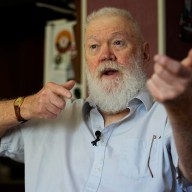Twenty years ago, nobody would have imagined smartphones, Facebook or even Google. Hybrid cars were far from reality, as was living on the International Space Station. Are we better at predicting the future today? Metro asked eight-year-old Londoner Calder Christopher and futurist Chris Carbone to envision what our daily lives will look like in the future. Check back in 20 years to see how accurate their predictions were.
Transport
Christopher: Cars will fly and there will be a new way of getting around, a box you step on to and it takes you to places. Airplanes will be able to go into outer space.
Carbone: People will link their cars to rapid transit systems, where cars travel together at an automated speed. To make an exit, you’ll just instruct the car to leave the “car train.”
Jobs
Christopher: Spaceships will fly people to outer space where they work. Aliens will smell new food to see if they’re edible for humans.
Carbone: New jobs will exist in nano and neurotechnology, areas that study how the brain interacts with things like computer devices and pharmaceuticals.
Communications
Christopher: There will be a phone that shows the person’s face when someone wants to chat with them.
Carbone: Whoever you want to talk to will be instantly available. Youngsters will want to be always connected to their network, primarily using smartphones.
Housing
Christopher: People will live in buildings that look like big temples—one section of the temple for each family.
Carbone: People will still live in the types of houses you see today, but they’ll use less electricity and water. Every home will harvest its own energy as well.
Schools
Christopher: Schools will look the same on the outside as in today, but there will be more stuff inside the buildings. Everyone will have an iPad. It will be cool.
Carbone: Children will have a personalized digital learning record that will follow them throughout their education—in a similar fashion to people today who have a constantly updated profile on Facebook.
Best innovations
Christopher: There will be a gadget that you’ll tell, “clean my room” and he’ll do it. Police will have robots that catch bad guys.
Carbone: Biometrics will be used as payment. You’ll just to go a machine that will scan your retina or fingerprint. Cash machines will go the way of the phone booth.
















